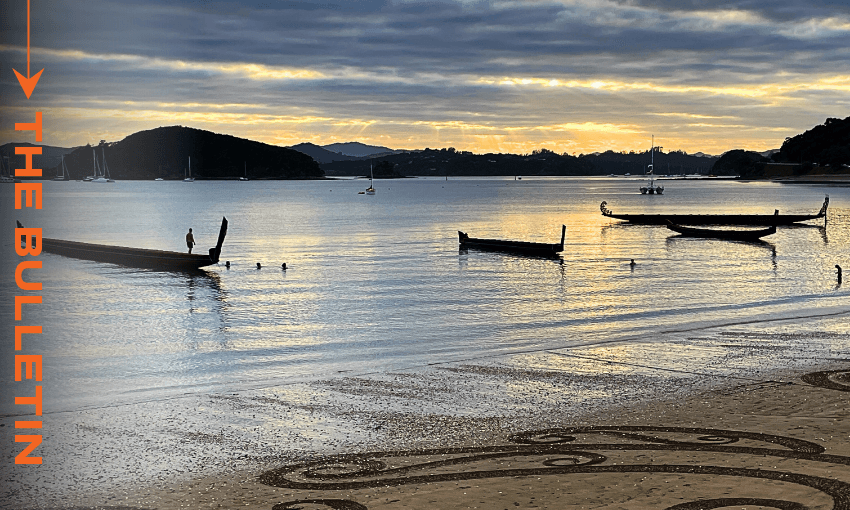Political aspects of Waitangi week may be moved in 2026, writes Anna Rawhiti-Connell for The Bulletin.
To receive The Bulletin in full each weekday, sign up here.
Celebration and on-the-ground politics
For the third year in a row, I have returned from Waitangi full of food and deep regrets about not shoving down one more pottle of raw fish and one more hunk of fry bread. It’s always interesting to actually be there in the warm embrace of Northland’s manaakitanga, watching kids jump off the bridge as golf carts cruise by, traffic managed via waves, east coast/Northland waves and friendly yelling, and then read the coverage. Inevitably, the focus is on the politicians, and in the wake of discord caused by the Treaty Principles Bill, “a divided nation” and an “overshadowing” of the day.
As The Spinoff’s Lyric Waiwiri-Smith observes in this morning’s Waitangi Day wrap-up penned by her and The Spinoff’s Ātea editor, Liam Rātana, “the time given for politicians to hold their forums and speak their piece is minuscule and, in many ways, insignificant in comparison to the six days of celebrations,” and “Sure, there were plenty of demonstrations, but they weren’t the focal point.”
As Rātana reports, in a break from previous years, two forums were running in parallel alongside the main programme at Te Whare Rūnanga, or the upper Treaty Grounds – one at Te Tii Marae and one at Te Korowai ō Maikuku (the boat house). The latter was organised by Eru Kapa-Kingi and other key members of the Toitū Te Tiriti group who organised last November’s hīkoi. Waiwiri-Smith observes that “one belief was virtually universal within the tent: existing as Māori is inherently political.”
Circus or supremely organised venting of passions?
Carefully quibbling with Shane Jones’s assessment of the pōwhiri being turned into “a circus” by the protestors who turned their backs on National’s Tama Potaka and the mic being taken away from Act’s David Seymour, The Herald’s Simon Wilson writes (paywalled), “But watching from the outside, what I see is a highly ritualised and highly passionate affair, where tikanga obliges everyone involved to vent their passions within prescribed limits. It’s supremely angry, supremely organised, non-violent protest. In my view, that’s pretty magnificent.”
RNZ’s Jo Moir has a good piece outlining some of the underlying tensions, frustrations and last-minute decisions that led to events on Wednesday. RNZ’s Ella Stewart has a nuanced and well-researched piece on the protestors who turned their backs on the politicians.
As Waiwiri-Smith wrote yesterday, the back turning at the pōwhiri eradicated any “doubt about the distance between the coalition government and Māori”. The pōwhiri was shorter than usual and, aside from Seymour’s half speech, didn’t have the same oratorial crackle as last year. As Waiwiri-Smith writes, “a short and largely uneventful event is likely what the coalition was also hoping for.”
Crown accused of filing ‘for divorce’ while Māori remained ‘blissfully unaware’
The dawn service marks the formalities of Waitangi Day itself, as distinct from the day before when the pōwhiri for the politicians is held. It’s a reverent affair and probably one of the few public occasions in a country where the majority identify as “non-religious”, where religious leaders, prayer, and spirituality take centre stage. Methodist leader Te Aroha Rountree had the cut-through of the morning, likening the Crown-Māori relationship to a marriage, accusing the Crown of filing “for divorce” while Māori remained “blissfully unaware”.
Change ahead for next year?
Next year is an election year, and while we can safely bet on the Treaty Principles bill being dead by then, capital P politics will undoubtedly rear its head at Waitangi in 2026. As Newsroom’s Laura Walters reports, most of the political aspects of the week may be moved back to Te Tii Marae. While the treaty was signed at Te Whare Rūnanga at the upper Treaty grounds, as Walters explains, Te Tii Marae is where the discussions and debate were held in 1840. The pōwhiri was moved in 2018 “in part to remove some of the charged political debate from the proceedings and have MPs present themselves as united parliamentarians rather than party politicians,” Walters writes. Te Tii has also been undergoing refurbishment and has reopened this week.
What didn’t happen at Waitangi?
Prime minister Christoper Luxon wasn’t at Waitangi but in Akaroa at Ōnuku marae, hosted by Ngāi Tahu. Pro-Palestine protesters made an appearance. As RNZ’s Russell Palmer reports, Luxon’s speech echoed his State of the Nation address, focusing on economic growth and what could be achieved when iwi and government cooperate. In his address, Ngāi Tahu kaiwhakahaere Justin Tipa said, “A National Party that fails to take leadership on matters of fundamental importance to the identity of our nation is not worthy of its own name … we do need growth, we do need investment, we should be ambitious. Ngāi Tahu wants those things too. But simply going for growth and liberalising the economy isn’t going to cut it.”
Gone by Lunchtime Waitangi special
Recorded on the sandy shores of the mighty North, guest hosts Liam Rātana and Lyric Waiwiri-Smith (along with regular producer Te Aihe Butler) discuss the problem of David Seymour, Tama Potaka’s messy kūpapa-kaupapa wordplay, the (seemingly undercooked) te Tiriti Commission proposal, and what we’d like to see at Waitangi in 2026. Listen here or wherever you get your podcasts.
More Waitangi reading from The Spinoff
Ngāpuhi settlement stalemate: Why is the Crown funding an entity with no mandate? — Liam Rātana
What would migration look like if te Tiriti o Waitangi was honoured? — Eda Tang
An updated Te Tiriti reading (and watching and listening) guide


